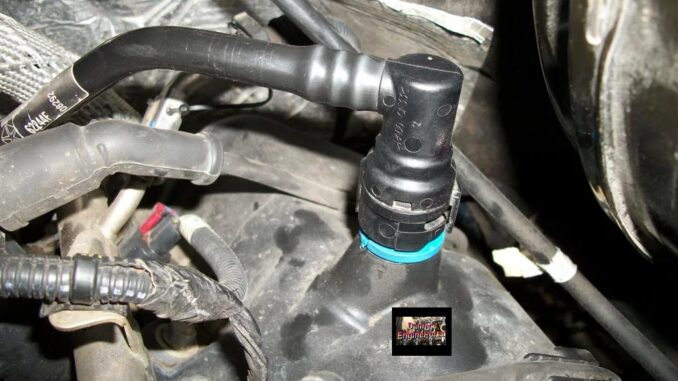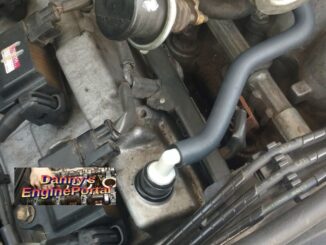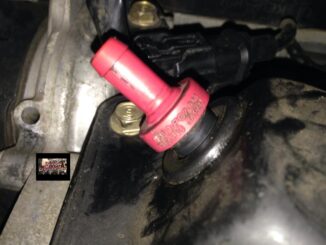
Replacing a (PCV) valve, isn’t difficult. But, sometimes accessing it can be a struggle, depending on your vehicle.
So, most people don’t realize how important regular maintenance is, on your (PCV) system.
And, then only pay attention, after a failed (PCV) valve disrupts engine performance, and internal components.
First, the objective of the (PCV) valve, is to redirect or recycle the engine’s blow-by gases. Consequently, by sending them back into the intake manifold.
But, lack of (PCV) valve regular maintenance, can eventually contaminate the air intake with oil. So, if it is blocked the crankcase pressure will build to a level, that will create leaks, and burn engine oil. And, that’s why every vehicle regardless of type or application, must have regular (PCV) valve maintenance.
Dangers Of Extended Oil Change Intervals
As an engine rebuilder, I believe there are only a few things, that would cause any engine to fail:
- Lack of proper engine lubrication.
- Contamination ( Dirt, Fuel, Coolant ).
- Excessive heat.
Every vehicle, regardless of type or application, must have regular oil changes, to remain in sound running condition. The real question is, which interval will work best for your vehicle.
Oil Is Cheap, Compared To Many Unexpected Repairs, From Lack Of Regular Maintenance
Synthetic oil, is much tougher than conventional oil. One reason to use synthetic oils, is their ability to clean the engine. As a result, of their enhanced cleaning properties, they actually get dirty faster.
Contaminants must be removed, once the cleaning is done. Oil also has a, limited capacity on how many particles it can hold. So, by not changing the oil, particles already in the oil, will act like an abrasive. Because of this, the oil isn’t capable of providing, the necessary lubrication for metal parts.
Sludge occurs when, old oil begins to gel or solidify in an engine. When sludge begins to build up, oil isn’t able to flow freely through the engine.
As a result, causing oil starvation to:
- Crankshafts.
- Engine bearings.
- Camshafts.
- Valve train components.
Your Engine Also Needs, Clean Air To Breath, This Includes The (PCV) Valve System
The same contaminates that damage your oil, also affect the (PCV) system. You don’t realize how important the (PCV) system is, until you see what it can affect:
- Increase in internal engine pressure.
- Failure of one or more, oil seals or gaskets.
- Engine oil leaks.
- Increased, oil consumption.
- Moisture and sludge buildup, inside the engine.
- Can trigger the “check engine” light.
- Engine surges and possibly, black smoke.
- Lean, air fuel mixture.
- Presence of engine oil, in (PCV) valve or hose.
- Hard engine starting.
- Rough engine idle.
- Engine misfires at idle.
So, as you can see, replacing your (PCV) valve, is more important than you think.
General Instructions, For Replacing A (PCV) Valve
Consult your owner’s or repair manual for specific instruction, because they are not all the same.
I prefer to only use OEM parts ( From the Dealer ) for this. Why you ask !
- Not universal, but actually made for your vehicle.
- More, exact tolerances.
- Better, quality.
- Always the same fit, ( Had one that had an elbow, that was in the way ).
- So, start by finding the (PCV) valve, using your repair or owners manual.
- It’s usually on or near, the intake manifold or on the valve cover. The (PCV) valve is connected to a hose.
- Loosen the hose clamp and check the condition of the hose. Replace any cracked, pinched, spongy, clogged, or sticky hoses.
- Remove the valve. Some valves are held in place, with a grommet and can be pulled free. Other valves need to be, unscrewed by hand or with a wrench.
- Check the condition, of the rubber grommet. Replace the grommet, if it’s showing signs of wear.
- Screw in the new valve by hand or push the new valve, into the rubber grommet.
- Reconnect the hose, and secure the clamp.
- Finally, start the engine, and check for any oil or vacuum leaks.
Conclusion
So, if you have a bad (PCV) valve, (PCV) valve replacement, could eliminate the problems listed above. Because, over time, oil breaks down and becomes contaminated with dust, dirt and debris from the engine. Finally, when that happens, oil can’t properly do its job.
BY DANNY BENDER




